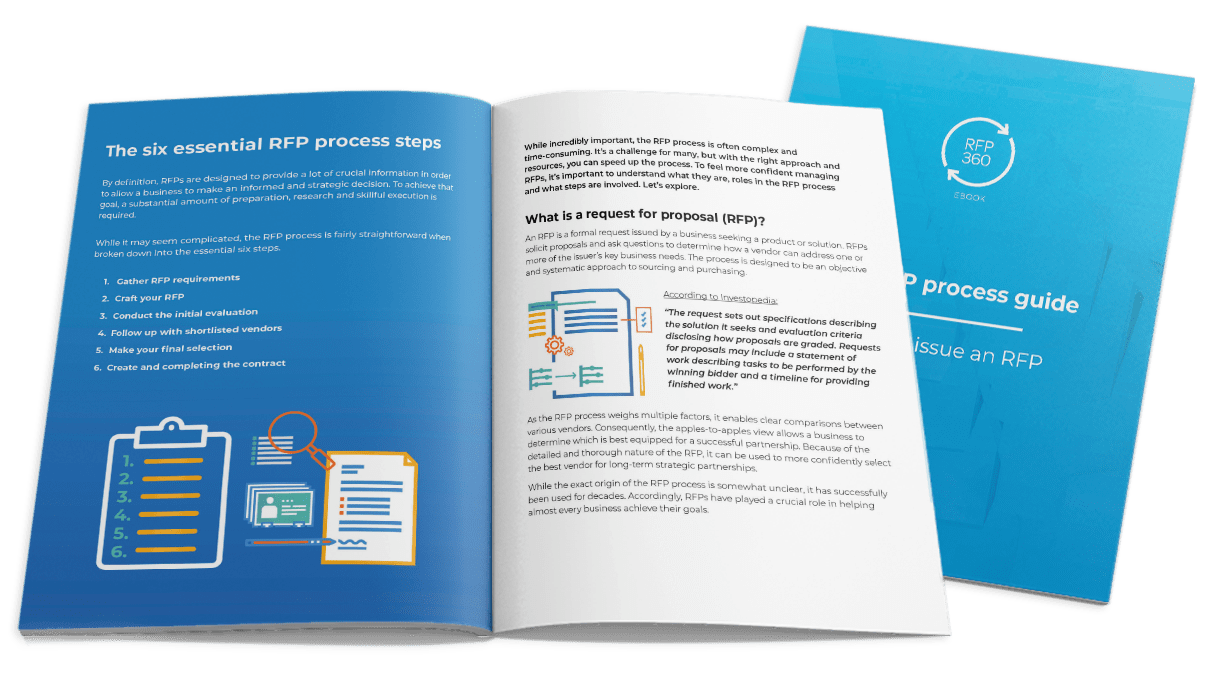

At the end of a lengthy RFP process, after you’ve evaluated the vendor proposals and selected the best option, what comes next? The best part. You get to share the good news with your vendor of choice using an RFP award letter.
In this blog, you’ll learn what an RFP award letter is as well as alternate names for it. Then, we’ll explore tips for writing a great award letter. Finally, we’ll look at some RFP award letter examples and templates to inspire you.
A request for proposal (RFP) award letter is a formal notification to a supplier that they are the vendor of choice for a specific opportunity. You can also use the award letter for any RFx process. For example, you may use an award letter to notify your selected vendor after issuing a request for quotation (RFQ), request for qualifications (RFQ) and request for information (RFI).
An RFP award letter may also be referred to as a contract award letter, notification of award, notification of intent to award letter, award notification letter and so on. No matter what you call it, this letter is an important part of the RFP process.
Explore the full RFP process in more detail in this ebook: The RFP process guide.
 RFP Process Guide" width="392" height="239" />
RFP Process Guide" width="392" height="239" />
Created and sent by the procurement manager, the contract award letter serves a dual purpose.
First, the letter enables a vendor to plan and prepare to serve the customer before the contract has been finalized. Typically, there’s a delay between the final vendor selection and execution of the contract.
In private organizations, this delay is a result of the complex negotiation and contracting process. On the other hand, in public organizations, sending the award letter and proposal rejection letters begins a standstill period. This step is an intentional delay in the RFP process. Indeed, the wait period enables unsuccessful bidders to review the RFP process and raise any concerns regarding the vendor evaluation and scoring process.
Either way, sending an RFP award notification letter enables the vendor of choice to confidently move forward. For example, they can invest time planning for onboarding, resource allocation and any other steps that will enhance the future customer relationship.
Second, the RFP award notification letter serves as documentation of the proposed outcome of the RFP. The entire RFP process is designed to enable audits and transparency. Consequently, the RFP award notification letter documents important information.
If needed, the letter may be used if an audit of the RFP process is required. For instance, the letter records the date of the selection, intended outcome, selection justification and any required caveats. Essentially, the letter reduces risk by creating a clear and traceable path from the initial RFP to the final supplier selection.
You may feel like adding a disclaimer is an extra step when awarding routine or low-value RFPs. While it may seem like it’s not worth the time, it’s important not to skip it. Protect your business by adding simple language to clearly state the award letter isn’t a guarantee or promise. If selected, the vendor must now proceed with contract negotiations and the award letter does not imply acceptance of the terms presented in the RFP.
To put it simply, the letter should let them know that you’d like to do business with them, but that’s all dependent upon negotiations leading to a formalized and executed contract.
What you should put into your award letter varies based on the type of business you’re in. Generally, private organizations have significantly more flexibility than government agencies. For some, a very brief note is sufficient. And, for others, it’s helpful to include more detail. At a minimum, your contract award letter should include the name of the vendor of choice and your disclaimer. Beyond those two key elements, you can choose to include other sections and information.
Tip: If you use RFP management software to issue eRFPs, consider creating each of the above sections in the tool. This enables you to quickly create a letter simply by selecting the sections you need and filling in the necessary information.
The contract award letter needs to strike a balance between encouraging the selected vendor and maintaining a strong position for negotiation.
After a lengthy RFP process, the last thing you want is for your best vendor to walk away from a deal they perceive as stagnant. However, you also want to avoid the perception that you need them more than they need you — which gives them the upper hand in contract negotiations.
Procurement guidelines from the Northwest Territories Public Works and Services division suggests not using words like ‘won’ or ‘winner’ for this reason, saying:
“If contractual items are still to be finalized and you indicate to the proponent that they are the winners, your negotiating position will be diminished. Instead, you may wish to advise them that, after initial evaluation, their proposal was rated the highest and could potentially provide the best value, but a final written contract still needs to be prepared.”
There are a lot of helpful sample contract award letters out there. As you browse the letters provided below, remember that you’ll need to consider how each would work within your own unique RFP process.
As a procurement consultancy, the professionals at Mills & Reeve have seen a lot of award and rejection letters. Fortunately, they’ve used that experience to create an editable contract award notice template with clear instructions for each customizable field. The letter is clean, concise and clear — which is why it’s one of my favorite examples.
This template provided by the State of Maine covers all of your bases. Indeed, you can use it to notify all participating vendors about the outcome. In addition, it includes fields and instructions for customization as well as all of the key elements.
Because government agencies use this award letter template, it contains very specific language about the conditions of acceptance as well as information about the appeal process for unsuccessful vendors.
If you’re looking for templates for the RFP process, look no further. Helpfully gathered in one location, you can explore procurement templates for nearly every step of the process here. For example, you can download eight different award notice templates to address various RFP outcomes.
This sample notice of award is short and sweet. Indeed, the letter identifies the winner, provides next steps as well as the appropriate legal provisions. In this example, the letter addresses all of the participating vendors.
The RFP issuer in this intent to award letter addresses the correspondence directly to the selected vendor, FieldTurf USA, Inc. The letter is fairly formal and identifies that the vendor was selected because they were the lowest responsive and responsible proposal.
Occasionally, a buyer sends the award letter after the contract has been fully negotiated and agreed upon. In this case, Hall County Schools selected and contracted with E.K.G Security. Often this indicates that the letter is from a government entity. In this case, the award letter is part of a required formal process intended to document the RFP for compliance purposes.
Brevity and clarity prevail in this contract award letter example. Indeed, ART communicated their vendor selection and the necessary details in less than 150 words. In addition, the letter provides the successful candidate with helpful contact information and next steps for contract negotiations.
There’s no doubt that the contract award notice letter is an important part of the RFP process. Not only that, but it’s also one of the most rewarding steps in procurement. Indeed, it signals the closing of an RFP, a solution to a business problem and the formation of an exciting, new partnership. So, now that you have everything you need, go create a new RFP award letter and deliver some good news.
Find out why leading response teams across the world turn to Responsive for their Strategic Response Management and RFP software needs.